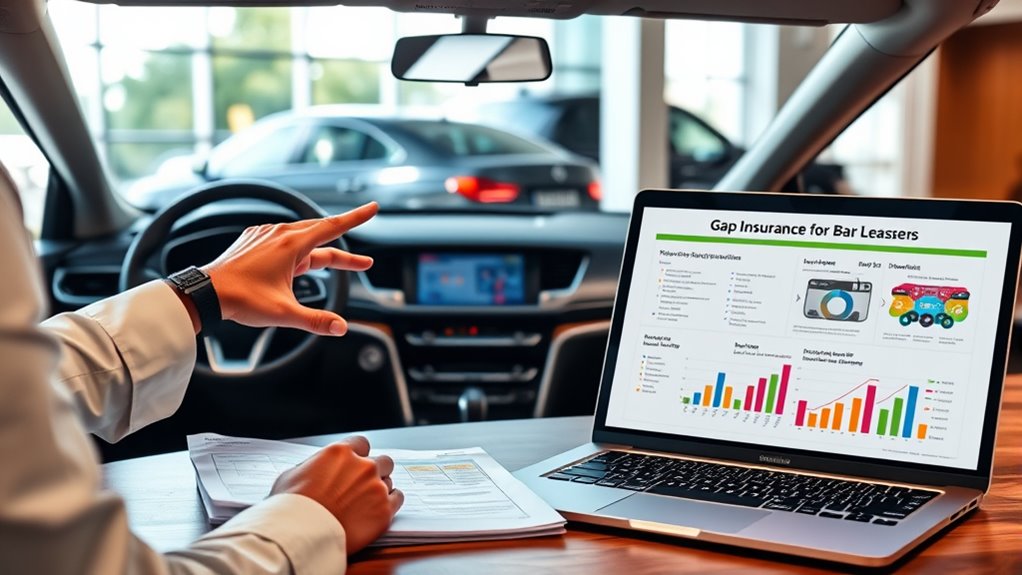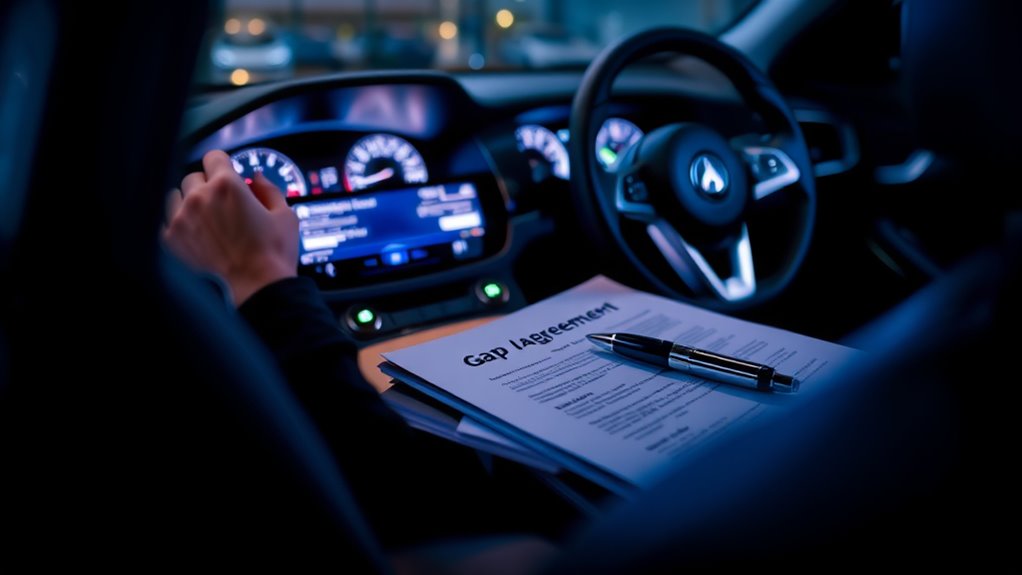If you lease a vehicle, gap insurance is a must because leased cars often depreciate quickly, leaving you responsible for the difference if it’s totaled. Unlike buyers who build equity over time, lessees face steeper early depreciation, increasing the risk of owing more than the vehicle’s worth. Without gap coverage, you’ll pay out-of-pocket for that gap. To see why gap insurance is essential for leasers and how it protects you, keep exploring.
Key Takeaways
- Leasers face steeper depreciation early on, increasing the risk of owing more than the vehicle’s value without gap insurance.
- Shorter leasing terms mean a higher likelihood of total loss before building enough equity, making gap coverage essential.
- Standard insurance often covers only market value, which may be less than the remaining lease payments or loan balance.
- Gap insurance protects lessees from significant out-of-pocket costs if their vehicle is totaled or stolen early in the lease.
- Buyers with loans also benefit, but leasing’s rapid depreciation makes gap insurance more critical for leasers.

Have you ever wondered what happens if your new car gets totaled or stolen before you’ve paid it off? If you’re leasing or financing a vehicle, this is a pivotal question to ask. The reality is, without the right coverage, you could be left footing a hefty bill even after losing your car. That’s where gap insurance steps in, especially for leasers. It’s designed to cover the difference between what you owe on your lease or loan and the actual cash value of the vehicle at the time of total loss. This isn’t just about peace of mind; it’s about protecting your finances from unexpected hits.
When comparing lease vs. loan, the differences are significant in terms of insurance costs and potential out-of-pocket expenses. If you’re leasing, you’re essentially renting the vehicle for a fixed period, often with restrictions on how much you can drive and how you can modify the car. Because lease terms are typically shorter, the vehicle’s depreciation can be steeper early on, which means the gap between the lease payoff and the car’s value can be substantial. Without gap insurance, you could end up paying hundreds or thousands out of pocket if your leased car gets totaled. On the other hand, if you’ve taken out a loan to buy the car, you’re building equity over time, and the depreciation curve tends to be more gradual. Still, if you experience a total loss early in the loan term, the gap between the remaining loan balance and current vehicle value can be just as significant, making gap insurance equally essential.
Leasing often involves steeper depreciation, increasing the risk of owing more than the car’s worth without gap insurance.
Insurance costs play a role in this scenario because comprehensive coverage is usually mandatory when leasing or financing. However, standard insurance policies often only pay the current market value of the vehicle, which can be less than what you owe. This is especially true with newer cars or those with high depreciation rates. Without gap insurance, you’d be responsible for covering this difference. It’s an added expense, but it can save you from devastating financial consequences. The premium for gap coverage is relatively affordable, especially considering the potential out-of-pocket costs you could face without it.
Ultimately, whether you’re leasing or financing, gap insurance is an indispensable safeguard. For leasers, it’s often more critical because of the higher likelihood of owing more than the vehicle’s value early on. Protecting yourself against these financial pitfalls means understanding how your lease vs. loan impacts your insurance costs and knowing that gap coverage provides a safety net when it’s needed most.
Frequently Asked Questions
Can Gap Insurance Be Canceled After Purchase?
Yes, you can cancel your gap insurance policy after purchase. To do so, contact your insurer for a policy cancellation. Keep in mind, your eligibility for a refund depends on how much of the policy term remains; some companies offer full or partial refunds if canceled early. Make sure to ask about refund eligibility when requesting cancellation, so you understand any potential charges or reimbursement you might receive.
Does Gap Insurance Cover Leased Vehicles in Accidents?
Think of your leased vehicle as a fragile glass sculpture—delicate and costly to replace. Yes, gap insurance covers leased vehicles in accidents, stepping in where your standard insurance claims fall short. It helps cover the difference between the actual cash value and your lease balance. This lease coverage guarantees you’re protected financially, even if your vehicle’s value drops faster than you can say “insurance claim,” giving you peace of mind.
Are There Age Restrictions for Gap Insurance Eligibility?
You might wonder about age restrictions for gap insurance eligibility. Generally, insurers set age criteria, often requiring drivers to be between 18 and 75 years old. These age restrictions are part of the eligibility criteria, and they vary by provider. If you’re within this age range, you’re typically eligible. However, if you’re outside it, you might need to explore specialized policies or additional options.
How Does Gap Insurance Affect My Monthly Payments?
Like a knight from the days of chivalry, you might wonder how gap insurance impacts your monthly payments. It can actually lower your financial burden by covering vehicle depreciation and loan coverage if your car’s value drops faster than your payments. This means your monthly costs stay more steady, protecting you from unexpected expenses if the vehicle is totaled or stolen, giving you peace of mind on the road.
Can Gap Insurance Be Transferred if I Sell the Vehicle?
When you sell your vehicle, the insurance transfer process depends on your insurer. Generally, gap insurance isn’t automatically transferable to a new owner during vehicle resale. You’ll need to verify with your insurance provider to see if they offer a transfer option. Some companies allow you to transfer your policy, including gap coverage, but it often requires approval. Always confirm with your insurer to ensure continuous protection.
Conclusion
Think of gap insurance as your financial safety net, catching you when your lease agreement hits a sudden snag. Without it, you’re steering a stormy sea of potential expenses alone, even after your car’s value drops. By securing gap insurance, you’re anchoring yourself against unexpected drops in value, ensuring you’re not left stranded. Protect your journey and steer confidently—because in the world of leasing, a little extra coverage can make all the difference.










